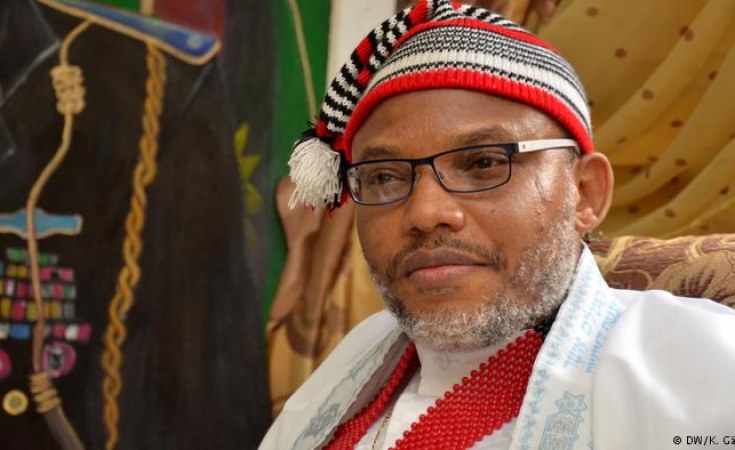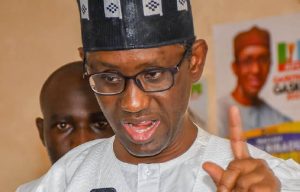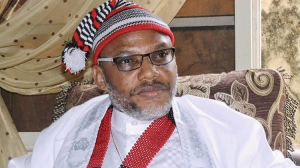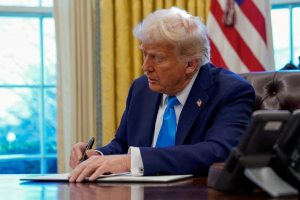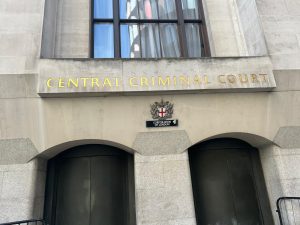Abuja, 18 June 2025 – The Federal High Court in Abuja has adjourned the high-profile trial of Mazi Nnamdi Kanu, leader of the proscribed Indigenous People of Biafra (IPOB), to Thursday, 19 June 2025, following a dramatic session marked by intense legal exchanges and procedural developments. The case, Federal Republic of Nigeria v. Mazi Nnamdi Kanu, continues to draw significant national and international attention due to its political and legal ramifications.
The presence of two officials from the United States government, observing the proceedings, underscored the global concern over what Kanu’s supporters describe as a “manifestly unjust and politically motivated trial.” Their attendance was warmly acknowledged by Kanu’s legal team, highlighting the case’s growing international profile.
The prosecution, led by Chief Adegboyega Solomon Awomolo, SAN, continued the examination of its key witness, codenamed PW-DDD, a self-described law enforcement operative. However, the session proved disastrous for the government’s case, as PW-DDD’s testimony unravelled under rigorous questioning.
The witness’s evidence relied heavily on hearsay, unverified newspaper clippings, and unsubstantiated allegations. Notably, PW-DDD cited a Vanguard article from 3 July 2021 to claim Kanu ordered the killing of 2,000 people—a baseless assertion unsupported by any investigative evidence. He also alleged Kanu authorised an attack on the Owerri Correctional Facility but admitted he was neither present nor involved in any official investigation of the incident.
Further weakening the prosecution’s position, the presiding judge rejected several documents the government sought to tender, ruling they were obtained without Kanu’s access to legal counsel, breaching fair trial standards.
The prosecution also submitted a report from the National Broadcasting Commission (NBC), which the defence did not contest. The report merely noted that broadcasting transmitters require regulatory approval and were “intended for broadcasting”—a point deemed neither novel nor incriminating.
Dr. Onyechi Ikpeazu, SAN, leading Kanu’s defence team, delivered a masterclass in cross-examination, systematically dismantling the prosecution’s case. Key revelations included:
No Investigative Report: PW-DDD admitted no official report from his supposed investigation was filed in court, claiming it was “in a drawer in his office” and not his responsibility to submit.
Lack of Direct Knowledge: The witness confirmed he never interviewed key figures, including Uzomma Benjamin a.k.a. Onyearmy, the Vanguard journalist who reported Onyearmy’s statement, or anyone connected to the killing of Ahmed Gulak. He also admitted he was not present at the Owerri Police Station or Correctional Centre during the alleged attacks.
Reliance on Newspapers: PW-DDD astonishingly stated he believed everything in newspapers yet contradicted himself by dismissing claims in the same Vanguard article about Sunday Igboho. Forced to read aloud a section describing Onyearmy’s claims as “mere allegations without proof,” his credibility took a further hit.
Evasive Testimony: PW-DDD’s rambling and incoherent responses frustrated the court, prompting the judge to intervene. “Answer the question put to you honestly without needless explanation and stop wasting my time,” the judge admonished. The witness, chastened, promised to “chastise himself” moving forward.
Even the prosecution’s lead counsel, Awomolo, was forced to caution his own witness against speculation, highlighting the disarray in the government’s case.
The adjournment to 19 June 2025 sets the stage for further legal battles in a case that has become a lightning rod for debates over justice, political persecution, and freedom of expression in Nigeria. With international observers closely monitoring the proceedings, the trial’s outcome could have far-reaching implications for Nigeria’s legal and political landscape.
Kanu, who has been in detention since his controversial rendition from Kenya in June 2021, remains a polarising figure. His supporters view him as a champion of self-determination, while the government accuses him of inciting violence and threatening national security. As the trial progresses, all eyes will remain on Abuja’s Federal High Court.

